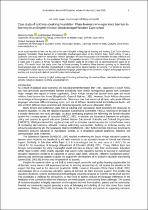Case study of isiXhosa-speaking foundation phase learners who experience barriers to learning in an English-medium disadvantaged Western Cape school
Date
2020Author
Salie, Maimona
Moletsane, Mokgadi Elizabeth
Mukuna Kananga, Robert
Metadata
Show full item recordAbstract
In the study reported on here, we focused on the use of English as language of learning and teaching (LoLT) for isiXhosaspeaking Foundation Phase learners in a historically disadvantaged school in the Western Cape, South Africa. It was a
qualitative case study within an interpretive research paradigm. We used focus groups and interviews for data collection and
conducted thematic analysis for the qualitative findings. The participants were 12 Foundation Phase learners (6 females and
6 males aged 7–9 years), 8 female Foundation Phase teachers (aged 29–56 years) and 12 parents/caregivers (aged 29–57
years). The results from this study show that isiXhosa-speaking Foundation Phase learners growing up in historically
disadvantaged areas and attending disadvantaged schools experience several barriers to learning. The barriers to learning
investigated included exposure to isiXhosa as primary language, psychological-social barriers, English as language barrier to
teaching and learning and a lack of parental involvement and support.

